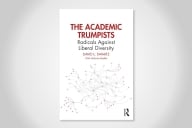You have /5 articles left.
Sign up for a free account or log in.
This moment, when many experts argue that higher education is in greater need of innovation than ever before, is probably a particularly bad time for what is supposed to be the federal government's primary driver of policy experimentation to be rendered obsolete.
But that appears to be what is happening, as the U.S. Education Department quietly revealed this week that the Fund for the Improvement in Postsecondary Education will forgo its main open grant competition. The main reason: The program's funds have been drained by "special focus" competitions mandated by the Obama administration and by Congressional appropriators, as well as by pet projects imposed on the agency by members of Congress, for the second time in four fiscal years (it also happened in 2005).
The department's announcement was not easy to find; it was a single line not on the Education Department's home page, or even FIPSE's home page, but on the page for the "comprehensive" program, which is designed to support and disseminate innovative reforms on higher education quality and student access. The small box on the page said: "A Comprehensive Program grant competition will not be held in FY 2009 due to budget constraints."
A spokeswoman for the Education Department said on Tuesday that the Web statement about FIPSE had been posted accidentally, and that the cancellation of the competition was a "non-story" because Congressional appropriators, in crafting the department's budget for the 2009 fiscal year in an omnibus spending bill in February, had essentially left no funds for what is supposed to be FIPSE's general competition.
The omnibus legislation provided a total of $133.7 million for the improvement fund, but $91.2 million of that total was eaten up by "earmarks," projects directed to specific recipients (in this case mostly colleges and universities) by members of Congress. (A list of those projects can be found starting here.) In addition, Congress mandated that another $10 million be reserved for a "new college textbook rental initiative," to "provide competitive grants to colleges to expand opportunities for students to rent college course materials." Lawmakers also dictated that an additional $10 million be set aside in FIPSE's budget for the "Postbaccalaureate Opportunities for Hispanic Americans program, to expand graduate academic offerings at colleges that enroll a significant number of Hispanic students."
Last week, Education Secretary Arne Duncan announced in a visit to Milwaukee Area Technical College that the department would set aside another $7 million from the improvement fund's budget for a "special focus" competition aimed at crafting "innovative and sustainable community college programs that prepare displaced workers for second careers."
The combination of all those set-asides, and the fact that another $15 million in the 2009 budget was reserved to continue grants that were competitively awarded in previous years, meant that there was just not enough money left for the sort of generalized competition that the comprehensive program is designed to promote. But it is perfectly appropriate, department officials said, for government leaders to set direction (or directions) for the Education Department's mini-performance lab, especially given the financial pressures on colleges and the country.
“Congress and the Administration have determined that the best use of these funds during these challenging economic times is to help create jobs, and make college more affordable,” a department spokesman, Justin Hamilton, said Tuesday evening.
That argument is not a new one, said Tom Wolanin, a senior associate at the Institute for Higher Education Policy who, as a longtime Congressional aide, was in on the creation of FIPSE during the Nixon administration.
"It has always been tugged between people who say this should be experts saying, 'These are what the most promising reforms and innovations are,' and the administration of the moment saying, 'Oh boy, here's a way we can do our thing,' " he said. "It long focused in part on whatever the fad of the day that the administration wanted to use. Then Congress got into it," with earmarks and its own "special focuses" like 2009's emphases on textbooks and Hispanic education. Lawmakers, Wolanin said, seemed to be saying, "If everybody can use this as its playpen for their priorities in innovation, why not us?"
As recently as three years ago, the final report of Margaret Spellings's Commission on the Future of Higher Education recommended that the Fund for the Improvement of Postsecondary Education "should be revitalized and its funding increased," and that "its original mission of promoting improvement and innovation in higher education needs to be reenergized to sustain and enhance innovation in postsecondary education."
But at a time when outside forces like that are putting increasing pressure on college leaders to find new, more effective and efficient ways to educate increasing numbers of lower-performing students, the deterioration of one of the primary tools for doing so -- FIPSE's comprehensive grant program -- would seem to run counter to one of the program's own stated characteristics, which help make it "unique" among federal higher ed programs, the department's Web page asserts.
The program, it says, "is responsive to practitioners. In its Agenda for Improvement, FIPSE identifies common issues and problems affecting postsecondary education and invites applicants to address these or other problems imaginatively. The Comprehensive Program welcomes proposals addressing any and all topics of postsecondary improvement and reform."
When it hasn't spent the money on pet projects, the language should probably be amended to say.









